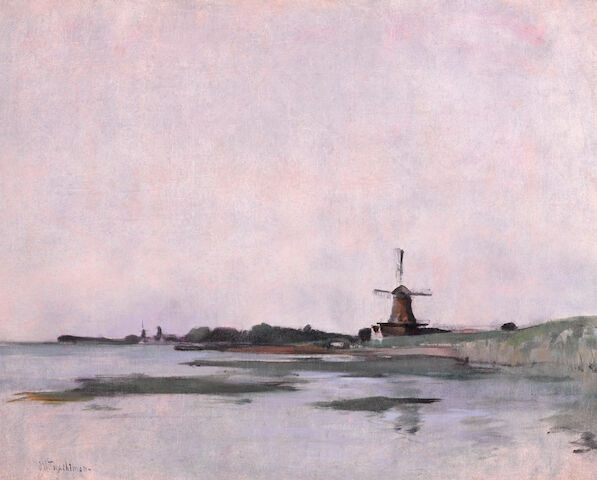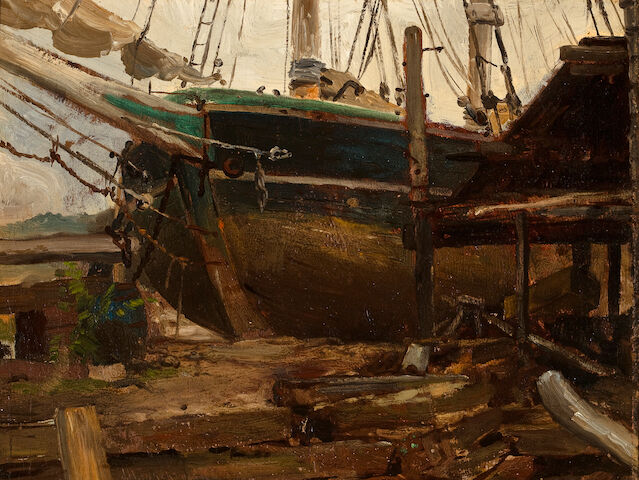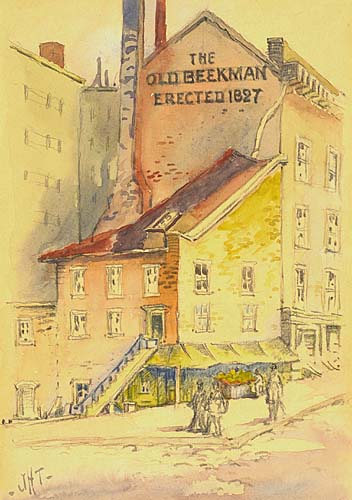- John Henry Twachtman was born in Cincinnati, Ohio on 4 August 1853 to German immigrants Frederick Christian and Sophia Droege Twachtman. Among the various jobs that Frederick Twachtman took to support his family was that of window shade decorator, work that young Twachtman also assumed when he was fourteen years old. While thus employed John Twachtman attended classes at the Ohio Mechanics Institute. After 1871 he was enrolled part-time in the McMicken School of Design (later the Art Academy of Cincinnati) where he met Frank Duveneck (1848-1919).
Although only five years Twachtman's senior, Duveneck, who had studied in Munich, had already achieved some success in the United States. The older artist invited Twachtman to share his studio in Cincinnati and eventually to return to Europe with him. In 1875 Twachtman began to study under Ludwig von Loefftz (1845-1910) at the Royal Academy of Fine Arts, Munich, there learning the broad, vigorous brushwork and somber tones typical of that school. A trip to Venice with Duveneck and William Merritt Chase (1849-1916) in 1877 did not lighten his palette appreciably.
Returning to the United States in 1878, Twachtman taught briefly at the Women's Art Association of Cincinnati, but spent much of his time in the east. He became a member of the Society of American Artists in 1879. The following year he returned to Europe, assisting as a teacher in Duveneck's school in Florence. In 1881 he married Martha Scudder in Cincinnati and the couple went abroad, staying until just before the birth of their first child in 1882. During this visit Twachtman spent time in Holland, painting and etching with his close friend Julian Alden Weir (1852-1919).
From 1883 to 1885 Twachtman studied at the Academie Julian in Paris, painting in Normandy and at Arques-la-Bataille, near Dieppe, in the summer. During this period his style changed considerably: his brushwork became more subdued while his palette was lightened. He may have felt the influence of the French painter Jules Bastien-Lepage (1848-1884) whose work was very popular among American artists at this time. Although Twachtman disliked Bastien-Lepage's meticulous attention to detail, he admired the pervasive quality of natural light found in his paintings. Twachtman's familiarity with the work of the expatriate James McNeill Whistler (1834-1903) may have also helped his work to become more thinly painted and atmospheric.
By 1886 Twachtman and his family had returned to the United States, probably spending much of their time in New York. During the winter of 1886-1887, the artist supported them by painting Civil War battle scenes on a cyclorama constructed in Chicago. In 1889 he began to teach at the Art Students League in New York and to produce illustrations for Scribner's Magazine. About this time he was able to purchase a farm in Greenwich, Connecticut which became the subject of so many of his best-known landscapes. The work that Twachtman produced in the 1890s, during his "Greenwich period," was characterized by increasingly rough and often layered brushwork.While living in the country Twachtman exhibited in New York throughout the 1890s. In 1893, the year in which his work was included in an American Art Galleries exhibition with that of J. Alden Weir (alongside an exhibition of works by Claude Monet [1840-1926] and Paul-Albert Besnard [1849-1934]), he also won a medal at the World's Columbian Exposition in Chicago. About a year later he received commissions for a landscape series of Niagara Falls and Yellowstone National Park.
In 1897 Twachtman was a founding member of The Ten and exhibited with them until his death in 1902. His final summer was spent painting at Gloucester, Massachusetts.
Sotheby's April 2014
JOHN HENRY TWACHTMANTHE RED MAPLE
JOHN HENRY TWACHTMAN
1853 - 1902TIGER LILIESLOT SOLD. 269,000Sotheby's May 2013
JOHN HENRY TWACHTMAN SNOW LOT SOLD. 269,000Sotheby's September 2012
JOHN HENRY TWACHTMANQUIET HARBOR, HOLLANDLOT SOLD. 34,375
Bonhams December 2013JOHN HENRY TWACHTMAN(American, 1853-1902)Dutch Landscape21 x 26inSold for US$ 37,500Bonhams 2010John Henry Twachtman (American, 1853-1902)Boatyard9 1/2 x 12 1/2in
Sold for US$ 14,640Christie's 2013JOHN HENRY TWACHTMAN (1853-1902)
FROM THE UPPER TERRACE
Estimate $250,000 - $350,000 Price Realized $447,750Christie's 2010
JOHN HENRY TWACHTMAN (1853-1902)
HARBOR VIEW
Estimate $20,000 - $30,000 Price Realized $20,000
Estimate $70,000 - $100,000 Price Realized $158,500Christie's 2007
JOHN HENRY TWACHTMAN (1853-1902)
UPLAND PASTURES (GREENWICH, CONNECTICUT)
Estimate $150,000 - $250,000 Price Realized $288,000
JOHN HENRY TWACHTMAN (1853-1902)
HEMLOCKS
Estimate $250,000 - $350,000 Price Realized $600,000
Christie’s 2006
Christie's 2005
Christie's 2001
JOHN HENRY TWACHTMAN (1853-1902)
AUTUMN MISTS
Estimate $150,000 - $250,000 Price Realized $248,000
Christie's 2000Swann 2002 JOHN HENRY TWACHTMANThe Old BeekmanEstimate $1,500 - $2,500Price Realized (with Buyer's Premium) $3,450
Skinner 2009-2010
Sold for: $1,126
Sold for: $23,700





















